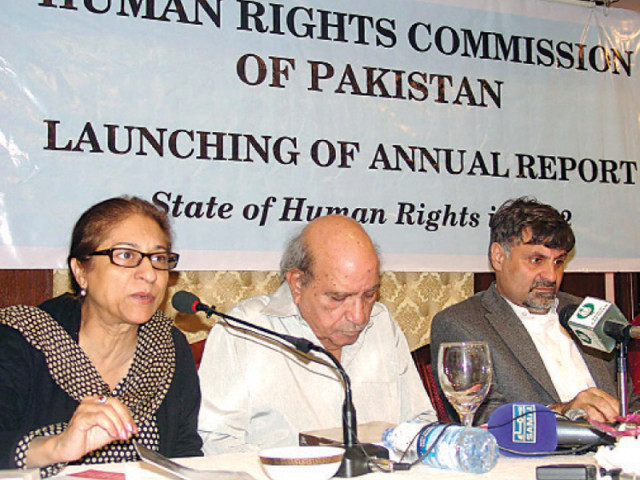Pakistan on the verge of becoming violent, undemocratic society: HRCP report
Political parties to field more candidates from among women and minorities.

Asma Jahangir speaking at the launching ceremony. PHOTO: INP
Pakistan is dangerously teetering on the brink of becoming a violent and undemocratic society, says a report of the Human Rights Commission of Pakistan (HRCP).
The HRCP launched its “State of the Human Rights in 2012” annual report in Islamabad on Thursday.
“Societies where the political elite severs its ties with the individual cease to function in a democratic manner and people resort to violence in a bid to be heard,” the report stated in its chapter on democratic development. “Pakistan is on the verge of becoming just such a society.”
The HRCP report provides an overview of the human rights situation in Pakistan through six main categories: rule of law, fundamental freedoms, democratic development, rights of the disadvantaged and social and economic rights.
Under the heading of “political participation”, the report noted that politically motivated violence was rampant in the country in 2012.
“The free exercise of democratic rights is curtailed by acts of violence,” the report stated.
According to the report, Bashir Bilour’s assassination was the most prominent case of assassination in 2012. Moreover, violence in Karachi alone led to deaths of around 356 political activists, the report says.
According to the report, there were some positive trends in 2012, however.
“There were no human rights direct violations as a policy by the government,” Asma Jahangir, human rights lawyer and activist, told The Express Tribune at the report launching ceremony.
“I believe that the new government, if and when it comes (to power), will address the rest of the human rights issues,” she added.
According to the HRCP report, the Election Commission of Pakistan (ECP) registered 84 million voters - with females making up for 43 per cent of the voters - in 2012.
But the report pointed out that the ECP failed to uphold some promises such as cancelling the voting results of constituencies where less than 10 per cent of women voted.
“The ECP was fighting for its own survival in 2012,” said IA Rehman, Secretary-General of the HRCP. “It won, and now it has started to fight for us.”
Rehman said that the ECP only became fully active in 2013 and so it remains to be seen if it succeeds in ensuring the political participation of the masses.
Jahangir said that the people and the media could help put human rights issues on the election agenda.
“It depends on each section (of the population),” she said, adding, “The women are already making a charter of demands; the youth should have its own charter.”
“There are some cross cutting issues like right of not to be tortured and redress for those who have been wronged,” Jahangir said. “The most important thing is to end impunity in this country.”
The HRCP report emphasised the political parties to field more candidates from among women and minorities in the forthcoming election.
Kamran Arif, Co-chairperson of the HRCP, said that elections have traditionally featured a give and take over municipal issues between voters and politicians. He said that only vague references to human rights appear in election campaigns.
“The general human rights violations that people face daily are not yet on the debate agenda,” he said. “We hope in the future, there would be more discussions on human rights violations so that political parties start talking about it.”
Published in The Express Tribune, April 5th, 2013.



















COMMENTS
Comments are moderated and generally will be posted if they are on-topic and not abusive.
For more information, please see our Comments FAQ